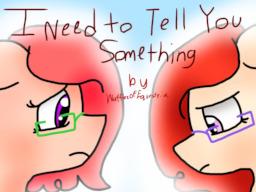
NOTE: I wrote this when I was 12 so it's really old and the tone is all over the place lol.
Peppermint Pause has kept a secret from her daughter, Twist, for a very long time. She decides that now that she is older, it might be time to tell her.

he/him - I like cute things and horror - I've been on this site for a long time so i apologize for any comments or fics I may have written lol
NOTE: I wrote this when I was 12 so it's really old and the tone is all over the place lol.
Peppermint Pause has kept a secret from her daughter, Twist, for a very long time. She decides that now that she is older, it might be time to tell her.
I think it's a bit rushed, and the part abut the therapist was a bit out of place. . .
It wasn't bad for a first try.
Not bad.
5237092 thanks! As for the therapist bit, it was because of the word minimum, hehe. Originally it was not included. And. I'm not the best with pacing, so I'm gonna work towards improving that.
5237123 Thanks!
Yes, not bad for a first effort. My advice would be as follows:
(Oh, hay, here we go, somepony punched his "persnickerty" button again.)
(Quiet, you.)
First -- when you have trouble meeting the 1000-word minimum, that's nearly always a sign that you're not putting enough detail into your descriptions of where the characters are and what they're doing. And such is the case here. Nearly all of this story takes place in a blank white room, as far as the reader can tell; there's no descriptive language to set the scene. We don't get any description of what Twist's house looks like, or what the doctor's office looks like, or what's in it. The coffee shop is barely described beyond "being shaped like a coffee cup" (which also seems out of place for Canterlot, since from what we've seen of it in the show, they don't do the kinds of whimsical buildings and storefronts that Ponyville does)... and so on. The characters, too, are barely described at all – what does Twist's mother look like? What does the doctor look like?
It's usually also a sign that you're rushing through the action too quickly. This jumps so quickly from one segment to the next that none of it really has any opportunity to make an emotional impact on the reader – and the lack of descriptive language really compounds the problem here, because there's not enough to pull the reader into the scene and make them feel the same things the characters do. This concept really needed about 3,000 - 4,000 words, at least, in order to have room to breathe.
Also, don't do this:
Remember, you're not writing a TV script here; indicating scene changes by directly telling the reader "afternoon at sugarcube corner", "later that day", etc. as the first line of the scene is poor practice, as a general rule, especially in a 3rd-person narrative.
From a technical, grammar standpoint:
When dialogue is followed by an attribution (also known as a "dialogue tag") of who said it and how, the two elements together are always treated as a single sentence, according to these rules:
(1) If the character's dialogue would end with a period if it were a stand-alone sentence, you end with a comma before the closing quote tag instead;
(2) the first word of the attribution (the part outside the closing quote) is not capitalized as the start of a new sentence; it is only capitalized if it is someone's name, or the pronoun "I";
(3) if the character's dialogue ends in "?" or "!", those marks are still used before the closing quote, but rule (2) on capitalization still applies.
Therefore, a line like this:
needs to be punctuated like this:
Also: dialogue tags ("said", "asked", and "replied") are your friends. Unattributed dialogue like this:
is confusing, because we don't have any idea who started the conversation, and it isn't until one character mentions the other by name that we can finally backtrack to sort out where the conversation begins and with whom.
Oh, and notice I specifically mentioned "said", "asked", and "replied"? Use them often, and use other speech verbs (especially highly-specific ones like "murmured", "explained", "deadpanned", "lectured", etc.) sparingly, if at all. Those three are effectively "invisible" to a reader, and they won't notice you using them repeatedly, but they will notice when an author seems to be going out of their way to avoid them. "Swallowed-a-thesaurus syndrome" is never a good thing. Not that you're having an issue with that now, since you're not really attributing the dialogue at all; just something to keep in mind for the future.
Not that you're having an issue with that now, since you're not really attributing the dialogue at all; just something to keep in mind for the future.
(How could you swallow a whole dinosaur, anyway?)


(I don't think that word means what you think it means, Scootaloo...)
(Why not? It's a "saurus", isn't it? Brontosaurus, tyrannosaurus, stegosaurus, thesaurus.)
(Good grief, Scoots, didn't ya learn nothin' in Miss Cheerilee's class last week?)
(A-hem. Do you three mind?)
(Sorry...) (Sorry...) (Sorry...)
Next, don't indent only the dialogue, and not the other paragraphs. It's bad practice, visually distracting, and not something you'll ever see in published writing. The proper way to do it is either to indent all paragraphs:
or, indent none of them, and put a blank line between each one:
(Less common, though still acceptable, is to do both – indent the first line of all paragraphs, and leave a space. Some people will ding you for it and tell you not to do it, but there's no rule that expressly forbids it. Personally, I think it's easier to read on a PC monitor, which is a "landscape"-oriented display that requires your eye to travel a longer distance to find the ends of the lines than a "portrait"-oriented book does.)
Anyway, aside from those, your grammar and spelling seems pretty reasonable overall; I saw a couple of typos, but no egregious errors like misusing the wrong homophones ("its" vs "it's", "too" vs "to" or "two", etc.), switching between past and present tenses in the same sentence, and so on.
Like I said: not bad for a first effort; you mostly just need to slow down, flesh things out with more detail and description, and let the narrative unfold at its own pace rather than rushing headlong through it. Again, whenever you find you're having trouble hitting the 1,000-word mark, you're probably not describing things enough, and rushing the action too fast.
(Ya done bein' pedantic now, sugarcube?)




(That's your new favorite word, isn't it, Applejack.)
(Hey, you taught it to me.)
(Touche.)
(Two what, now?)
(*sigh* Never mind. Say goodnight, Applejack.)
(Aw c'mon, that joke's older'n Celestia.)
(...)
(...she's standin' right behind me, ain't she.)
5237667 Thank you so so much for your advice! Since I am a newcomer, stuff like this is treasure to me. I really appriciate it! (Gosh, I hope I spelled that right, my autocorrect is not working and normally I'm a bad speller, hehe.)
Quotes aren't for emphasis. Italics are generally the go-to choice in this case.